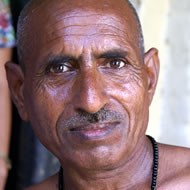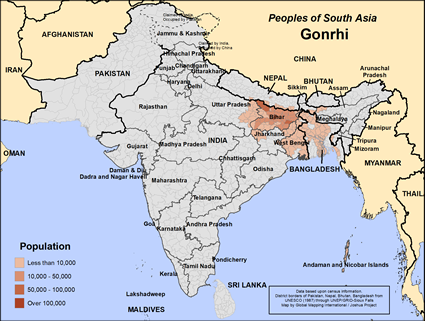Gonrhi in Bangladesh

Photo Source:
Copyrighted © 2026
Isudas All rights reserved. Used with permission |

Map Source:
People Group data: Omid. Map geography: UNESCO / GMI. Map Design: Joshua Project.
|
| People Name: | Gonrhi |
| Country: | Bangladesh |
| 10/40 Window: | Yes |
| Population: | 6,700 |
| World Population: | 822,700 |
| Primary Language: | Bengali |
| Primary Religion: | Hinduism |
| Christian Adherents: | 0.00 % |
| Evangelicals: | 0.00 % |
| Scripture: | Complete Bible |
| Ministry Resources: | Yes |
| Jesus Film: | Yes |
| Audio Recordings: | Yes |
| People Cluster: | South Asia Hindu - other |
| Affinity Bloc: | South Asian Peoples |
| Progress Level: |
|
Introduction / History
The Gonhri people are also known as Mallah or Nishad. They are a caste associated with boating and fishing. They believe themselves to be descendants of the legendary figure, Nishad, who ferried King Rama and his wife, Sita, across the Ganges River. That tradition has been passed down through the centuries. They take pride in their caste and consider their occupation as boatmen carrying Hindu devotees as a high calling or holy occupation. Others consider them to be a "backward" (meaning low prestige) caste. The Gonrhi people live mainly in India's states of West Bengal and Uttar Pradesh.
What Are Their Lives Like?
The well-educated ones among them are teachers and government workers, but the majority of them continue as their ancestors have done for centuries: cultivating or fishing. Within their fishing community, they have specialized work based on their subgroup. Some are boatmen, others are fishermen. Those who fish use fishing baskets rather than nets. Many of them belong to the Matsyajibi Unnyan Samity which seeks to improve the welfare of those engaged in the fishing trade. They usually find a mate through family negotiations. Though monogamy is the custom, they will make an exception if the wife is infertile. Then the husband can take a second wife. They don't permit divorce. Their daughters get an equal share of the family wealth if they don't have brothers. Otherwise, the boys receive it all.
What Are Their Beliefs?
The Gonrhi people practice Hinduism, the ancient religion of India. Hinduism is a catch-all phrase for the local religions of South Asia, so it is very diverse. At the popular level, Hindus worship and serve the gods of the Hindu pantheon. They visit Hindu temples and offer prayers, food, flowers, and incense to their gods in hopes of gaining protection and benefits. They do not have a personal or familial relationship with their gods like Christians or Jews. There are other Hindus who are much more philosophical, especially among the Brahmins. Almost all Hindus participate in yearly celebrations like Holi, the festival of colors and the start of spring / Diwali, the festival of lights / Navratri, the celebration of autumn / and Rama Navami, Rama's birthday.
What Are Their Needs?
Pride can be an obstacle. They can have high status as princes and princesses if they would only accept it. The Gonhri people need to accept the dignity of being his children rather than thinking they can gain dignity through their accomplishments.
Prayer Points
There are no Gonhri people in Nepal, Bangladesh or India who follow Christ, so pray that the 2020s will be a decade of spiritual breakthroughs in their communities. Pray for a "Book of Acts" type of movement to Christ among the Gonhri people in Nepal and India. Pray for the Gonhri people to understand and embrace that Jesus wants to bless their families and neighborhoods. Pray for Holy Spirit anointed believers from the Gonhri people to change their society from within. Pray for a movement in which the Holy Spirit leads and empowers Gonhri disciples to make more disciples.